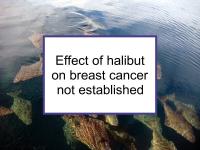Halibut is a dietary source of iodine, selenium, vitamin B12 and vitamin D, and also contains the marine omega-3 fatty acids docosahexaenoic acid (DHA) and eicosapentaenoic acid (EPA). Halibut is considered to contain "moderate" amounts of mercury, and should not be consumed more than six times per month for that reason.
Cancer-related effects of eating halibut
Halibut can be a fairly good choice for those who prefer to consume white fish, since it incorporates more DHA and EPA than other white fish. Both DHA and EPA have been associated with lower risk of breast cancer.
Population studies examining whether halibut influences the risk of breast cancer are not available.
Pan frying fish has been shown to release significant levels if carcinogenic heterocyclic amines (HCAs). Epidemiological studies have reported that consumption of fried fish is associated with increased risk of breast cancer. Based on published studies to date, the worst to the least harmful methods of cooking fish appear to be grilling, pan frying, oven broiling, deep frying, stir frying, oven baking, and stewing.
Additional comments
Halibut are found in the North Pacific and North Atlantic Oceans. The major species are Pacific halibut (Hippoglossus stenolepis) and Atlantic halibut (Hippoglossus hippoglossus). Most halibut sold to consumers in the U.S. is Pacific halibut, which has less than one-quarter of the omega-3 fat content of wild caught salmon. When used for sushi or sashimi in the U.S., Pacific halibut is often termed hirame (although, technically it should be called ohyo).
Halibut consumption should be avoided by pregnant women and nursing mothers due to its mercury content.
Halibut from U.S. fish farms do not incorporate added hormones
Atlantic halibut is more likely to be the product of fish farming than Pacific halibut. Halibut raised in fish farms tend to have less favorable omega-6/omega-3 fatty acid ratios since vegetable oils and other non-fish foods are used, in part, to feed them.
Growth hormones are not permitted in U.S. aquaculture. However, sex hormones and other compounds such as aromatase inhibitors that influence sex hormone levels may be given to increase fish production through sex reversal. This can be advantageous for producers when one sex of a given species typically grows bigger and faster than the other sex. While production of monosex populations is common for some fish such as farmed tilapia, it is not yet used in U.S. halibut farming, although it is being studied.
Note that while we are continually searching for new evidence specifically concerning halibut, there is not much interest in it among breast cancer researchers, so few studies are available.
